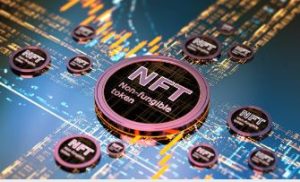Introduction
NFTs are traded and sold on popular marketplaces – OpenSea is probably the most well-known but there are also Rarible, Grimes’ choice, Nifty Gateway, with many more.
VeVe is (according to its parent company Ecomi) “an app-based marketplace for premium licensed digital collectables. With VeVe, users can obtain common, rare, or one-of-a-kind digital collectables, customise and showcase them in the virtual showrooms, as well as buy, sell or trade collectables with other VeVe users – all from the palm of their hand.”

The company has already released NFT from a number of well-known artists and brands such as “Back to the Future”, “Ghostbusters”, “Superman” and many more – but the biggest release was held in August 2021 when Marvel announced its first line of NFTs and launched its partnership with VeVe.
The appeal of NFTs is broad – it could be sports, or art fans, collectors of iconic brands or investors who are purchasing these as a speculative asset, with the hope that the value of the NFT will rise and it could be sold for a profit. The NFT market is also now worth billions of dollars. The NFT marketplace saw sales worth USD $2.5 billion in the first two quarters of 2021. On August 8 2021, the value of the NFT marketplace daily volume saw records break as OpenSea processed about $78.8 million in transactions! To get an idea of the growth in 2021, the same company processed $21 million in total in all of 2020.
NFTs are selling for record prices as the sentiment has changed in 2021 from considering these as a fad – to changing the landscape of digital art, collectables and adding revenue streams for many industries such as music, sports, in-game memorabilia etc.
In August 2021 – BOAX NFT announced the sale of its first Olympic themed NFT artwork “Olympic Happiness” to HRH Prince Narithipong Norodom of the Kingdom of Cambodia. The price was USD $16,000. It was the first high-profile sale of an NFT mentioning a Cambodian buyer. BOAX reported “The bidding for the “Olympic Happiness” NFT on BOAX NFT Marketplace started on 23 July (2021), coinciding with the Grand Opening of the Olympic Games. The highest bid of US$16,000 was placed on 8 August by HRH Prince Narithipong Norodom, grandson of HRM King Sihanouk Norodom of the Kingdom of Cambodia.”
There is plenty of evidence that the younger generation of Cambodians are interested in this NFT space, as well as eSports, blockchain and crypto – these, are the future. Although the legality of cryptocurrencies remains murky in the Kingdom, digital currencies have already been promoted by NBC which has one of the leading CBDC (central bank digital currency) in the world, with Bakong.
If you think from a cultural and artistic point of view, the different Cambodian organizations could make much-needed money from digitizing iconic Khmer history and selling them as NFTs. This could be a range of items from sculptures, artefacts, and even from popular creatives of Cambodia’s rich heritage (depending on who owns the rights. The added benefit of NFT is that artists/owners often retain a sales percentage if the NFT gets sold multiple times so there is an added value and ongoing income for rights owners, and even national organizations if they digitize famous Khmer artwork.
Social Media NFT
Influencers “can turn any of their photos, life moments or any other content be it a piece of exclusive art or music that could be turned into an NFT and sold to their fans.”
The idea is that influencers could sell these on the platform, and it would have a direct bidding option on each post where the highest bid would be revealed along with the post. Users can browse the Nafter platform and bet on their favorite influencers’ posts to buy the NFT of it. Fans decide the value of the photo, video, or art posted by their respective social media influencers.
Conclusion
Founded and launched in Cambodia, Fauna was chosen as the winner of the Asian Development Bank (ADB)’s ‘NFTs for Development in Asia’ competition. The Fauna team will create NFT images that are based on real-life endangered animals, with the sales of those NFTs contributing directly to the conservation of those animals. For example, the price paid for an NFT of the endangered Mekong dolphin would go straight to a Cambodian wildlife NGO responsible for supporting their conservation. Non-Fungible Tokens (NFTs) are a relatively new phenomenon that utilize blockchain technology (the technology behind Bitcoin and other cryptocurrencies) to create one-off, non-replicable pieces of digital information – anything digital can be turned into an NFT, including music, e-books, and images. When these pieces of digital information are turned into NFTs, or become ‘tokenized’, they are given an electronic signature that is used as a unique identifier which cannot be copied, substituted, or subdivided. The signature is recorded on an online ledger (the Blockchain) which is used to certify the authenticity and ownership as and when it is needed.
Author: Tanya Saraswat, in case of any queries please contact/write back to us via email to chhavi@khuranaandkhurana.com or at Khurana & Khurana, Advocates and IP Attorney.



